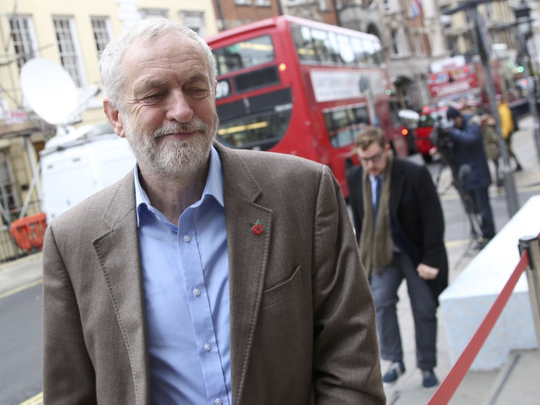
The Guardian’s latest ICM poll makes grim reading for Labour; but might there be a silver lining for its leader Jeremy Corbyn supporters? Could an election defeat result in a parliamentary Labour party that would be more Corbyn-friendly than is currently the case?
Back in March, the media had a great deal of fun with a leaked list put together by a Corbyn staffer that categorised Labour MPs according to their perceived loyalty to the leadership. The smallest group, made up of Corbyn himself and the 18 MPs most loyal to him, was designated the Core Group, while there were 56 MPs labelled Core Group Plus. The largest group, called Neutral But Not Hostile, was made up of 71 MPs. Core Group Negative contained 49 MPs and Hostile Group 36. Some 17 MPs weren’t included in any of the categories — and a couple of them appeared in more than one group. One way of answering the question, then, is to compare the safety or otherwise of the seats occupied by MPs in the list’s different groups.
Doing this reveals that there isn’t much difference in the majorities on which MPs loyal to Corbyn are sitting and those won by his detractors. There isn’t any obvious sense in which the Core Group (average majority 12,194) and the Core Group Plus (average majority 9,412) are much more likely to survive a cull of Labour MPs at the next election than Core Group Negative (average majority 11,656) or Hostile Group (average majority 9,941) — or for that matter, Neutral But Not Hostile (10,067).
Another approach is to take a guess at the vote share that parties might get at the next election, convert that to the seats they are likely to win and lose on that share, and see whether that makes a difference to the ideological composition of the Parliamentary Labour Party (PLP).
Now clearly, caveats apply: We’re assuming once again that the leaked list’s designation of Labour MPs is reasonably accurate; we’re assuming that the next election will take place on current boundaries; and we’re using one poll’s results and relying on the educated guesses built into vote-seat calculators. But we believe it’s worth our while.
If ICM’s latest results were repeated at a general election, the Conservatives would win 43 per cent of the vote and Labour 27 per cent, with the Liberal Democrats on 8 per cent, Ukip 12 per cent, Greens 5 per cent and the Scottish Nationalist Party 4 per cent.
This would result in the Conservatives gaining nearly 50 seats, bringing their total to 379 — a majority of 108. Labour would lose just more than 40 seats, leaving them with just 190, although since 10 of the expected survivors were not included on the loyalty list, we’ve had to leave them out of our calculations. This projection, likewise, suggests that a defeat at the next election will not materially alter the balance of pro and anti-Corbyn MPs in the PLP. Anyone supportive of the current leadership, then, who believes that Corbyn and those around him will benefit from some sort of a clear-out of his opponents by the voters, is likely to be seriously disappointed.
Just as importantly, should Corbyn step down in the wake of a defeat, there is no guarantee that a Corbynista successor will make it on to the ballot, thus ensuring that Labour’s currently pro-Corbyn grass-roots members and supporters can pick someone to carry on where he leaves off.
Leadership contender
If Labour is left with 190 MPs, then said the candidate will need 29 nominations to go forward for consideration to the members and registered supporters. With the Core Group reduced to just 17 MPs, the Corbynistas are going to need to recruit another 12 MPs from a Core Group Plus who, after the election, might not be feeling quite as positive about a left-wing leader as they may be now.
Given that voters don’t seem likely to deliver up a noticeably more pro-Corbyn PLP, Labour activists longing for one are going to have to rely on their own efforts instead.
If election doesn’t happen until 2020, perhaps they still have time to alter the composition of the Labour benches at Westminster by deselecting sitting MPs in favour of more ideologically congenial candidates. And, as an insurance, they can also press for the reduction in the proportion of Labour MPs needed to nominate a leadership contender.
But any such moves are bound to encounter fierce resistance from Corbyn’s opponents. As a result, things could get even bloodier for the Labour party in the next year or two than they have been already — unless, of course, British Prime Minister Theresa May decides to put it out of its misery by going to the country sooner rather than later.
— Guardian News & Media Ltd
Tim Bale is professor of Politics at Queen Mary University of London and the author of Five Year Mission: the Labour Party Under Ed Miliband.








